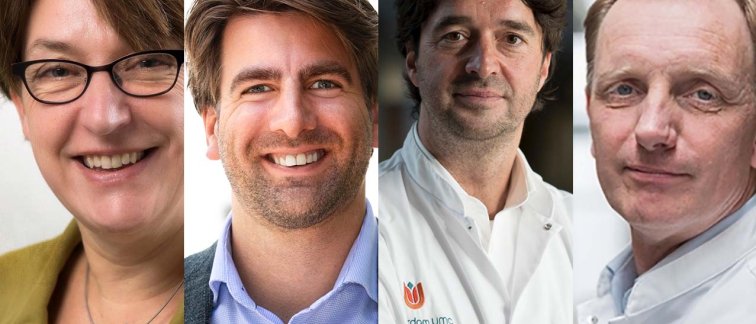TKI-PPP grant Amsterdam UMC stimulates its researchers to perform research projects together with companies in Public-Private Partnerships (PPP). The funding is provided by the Dutch government (Ministry of Economic Affairs & Climate Policy) through the Netherlands Enterprise Agency (RVO) and the Top Sector Life Sciences & Health (Health-Holland). The Top Sector stimulates, facilitates and finances a variety of public-private partnerships to realize its central mission “five more years of healthy living and reducing socioeconomic health differences by 30%”. They provide a financial instrument to help consortia consisting of research organizations, knowledge institutes, companies and health foundations to improve the healthcare of the future.
Prof. dr. Elga de Vries – Brain EVs
The goal is to create a new technology platform, to develop drug delivery devices to get across the blood-brain barrier into the brain, to fight not only dementia, but a wide range of other neurological disorders and rescue neuronal function.
Prof. dr. Elga de Vries – ProReMiSe
In the ProReMiSe project, the aim is to design and test new compounds that not only reduce inflammation but also restore neuronal function in patients with MS. Thus these newly developed compounds will slow down disease progression, thereby improving the quality of life of patients with MS.
Dr. Henk-Jan Mutsaerts – SANE-QC
Creating artificial intelligence algorithms that automatically detect the scan quality of MRI scans with the goal to be able to detect MRI scan quality on the fly so that we can directly repeat the MRI scans if necessary. And ultimately, to improve MRI diagnostics overall.
Dr. Joost Raaphorst - CONTRACT
The goal of this project is to improve therapies for treating myositis by creating a model that combines the antibodies of patients with a unique set up for the measurements of muscle fibers. This will increase our understanding of the interplay between the immune system, muscle fiber contraction and the effects of targeted immune therapy. In the future we hope to not only help patients with myositis, but also patients with other autoimmune disorders with neuromuscular involvement.
Prof. dr. Rik Schuurman – IDEAL-STIM
Deep Brain Stimulation (DBS) is a very effective therapy for Parkinson’s disease reducing the symptoms of tremor, rigidity and slowness of movements. This is achieved by electrical stimulation through electrodes implanted in the brain. Currently, determining the optimal programming of DBS is a laborious process, systematically testing many stimulation settings for clinical effects and side effects, requiring hours from healthcare professionals and frequent burdensome hospital visits for the patients. In this project we will simplify the programming of DBS and increase its effectiveness in Parkinson’s disease by building an algorithm to predict individual programming of DBS.
Videos by Caren Huygelen

